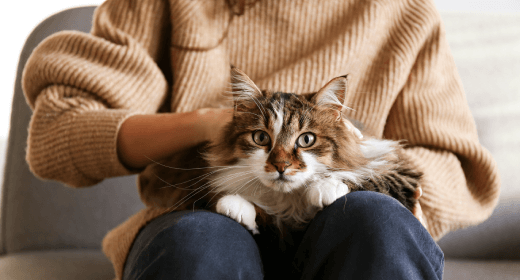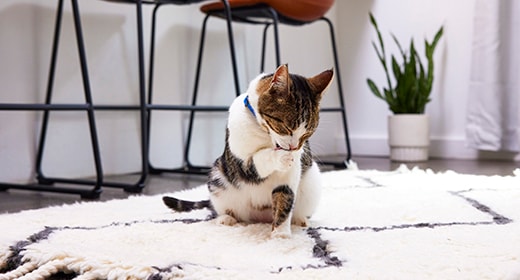

If you have ever indulged in a delicious piece of roasted chicken and noticed your furry friend giving you those irresistibly adorable, pleading eyes, you have probably wondered, 'Can cats eat chicken?'.
Chicken is a good source of protein, and you will find it as an ingredient in many commercial cat foods. However, there are some guidelines to follow. In this blog, we will uncover the delicious details about whether chicken is a friend or foe to our beloved furballs.
Is chicken good for cats? Well, when it comes to feline nutrition, chicken is often regarded as a favourite among our furry companions. Cats are obligate carnivores, which means that animal protein is essential for their overall health. Chicken, a lean and readily available source of protein, can offer several health benefits to your feline friend:
Chicken is a superb source of high-quality animal protein, which is essential for your cat's muscle development, growth, and overall body maintenance. Protein aids in tissue repair and supports a healthy coat.
Chicken is rich in essential amino acids, such as taurine, which is vital for cats. Additionally, taurine deficiency can lead to severe health issues, including heart problems and vision impairments.
Chicken contains essential vitamins and minerals like vitamin B6, niacin, phosphorus, and selenium. These nutrients contribute to your cat's overall well-being and help maintain a strong immune system.
Chicken has a naturally high moisture content, which can help keep your cat hydrated, especially if they are reluctant to drink water. Proper hydration is crucial for kidney health.
Most cats find chicken incredibly tasty, making it an excellent option for enticing picky eaters or cats with a diminished appetite.
While chicken can provide numerous health benefits to your cat, it should always be offered in moderation and as part of a balanced diet. Consult your veterinarian for guidance on the appropriate portion sizes and to ensure that chicken complements your cat's dietary needs.
If you have ever wondered whether it is safe to feed your cat raw chicken, be aware that it poses significant risks. Raw chicken, like other raw meats, can be contaminated with harmful. These pathogens can lead to severe gastrointestinal issues, including vomiting, diarrhoea, and even food poisoning in both cats and humans.
Additionally, when feeding your cat raw chicken increases the risk of nutrient imbalances and deficiencies, as it may lack essential nutrients that are destroyed during cooking.
To ensure your cat's safety, it is best to cook chicken thoroughly. Cooked chicken eliminates the risk of bacterial contamination and provides a safer and more digestible option for your feline friend.
Chicken bones, especially small and brittle ones like those in wings or drumsticks, can pose serious health risks to cats. Unlike dogs, cats have a more delicate digestive system and cannot process bones safely. When cats chew on or swallow bones, they can:
Small bones can get logged in a cat's throat, causing choking, gagging, or even airway obstruction.
Chicken bones can splinter into sharp pieces, which may damage a cat's mouth, throat, or digestive tract.
Bone fragments can create blockages in the gastrointestinal tract, leading to painful and life-threatening conditions.
Sharp bone fragments can puncture a cat's intestines or stomach, causing internal injuries and infections.
To keep your cat safe, always remove bones from chicken before offering it to them. Offer boneless, cooked chicken as an occasional treat, but ensure that it is free of seasonings, spices, and any potentially harmful ingredients.
Cats are known for their carnivorous cravings, but before you toss that raw chicken their way, hold your whiskers! While it might seem like a natural choice, there are some serious risks involved. Let's take a bite-sized look at what you need to know.
Raw chicken can be a breeding ground for nasty characters like Salmonella and Campylobacter. These troublemakers can cause a real bellyache for both your cat and you. Even if your feline friend does not show symptoms, they could pass these pathogens along to you, especially if you have got a delicate immune system. A real 'no-thank-you' dish!
Cooked or uncooked chicken bones can splinter into shards of trouble. These bone bits can wreak havoc on your cat's insides, causing choking, punctures, or blockages. To stay on the safe side, opt for boneless chicken or consider a vet-approved alternative.
Chicken is a protein powerhouse, but it is not the only game in town. Feeding your cat only raw chicken could lead to a dietary disaster. It is missing some crucial nutrients that your feline friend needs for a balanced diet. To keep their tails wagging, consult with a vet or feline nutrition guru to whip up a menu that is both tasty and nutritious.
When it comes to preparing raw chicken for your feline companion, a few key considerations can make all the difference in ensuring a safe and healthy meal:
Freshness is paramount. Check the sell-by date, and inspect the chicken for any signs of spoilage, such as an unusual odour or discoloration. Cats, like us, prefer their meals fresh and free from any hints of spoilage.
Handle raw chicken with care. Ensure your cutting board, knives, and utensils are clean and sanitized to prevent cross-contamination. Keeping a dedicated cutting board for cat food prep can help maintain hygiene.
Rinse the chicken thoroughly under cold water to remove any debris and pat it dry with a clean paper towel. This step helps minimise the risk of bacterial contamination, keeping your cat's meal safe and healthy.
While chicken can offer benefits to cats, it is important to remember a few key points. Always opt for cooked, boneless chicken in moderation, as raw chicken carries health risks due to bacterial contamination and nutrient imbalances. Furthermore, never offer chicken bones to cats, as they can be harmful.
Prioritising freshness and maintaining proper hygiene when preparing chicken for your cat is essential to ensure its safety and well-being. If you have any doubts or need guidance, consulting a veterinarian or a nutrition expert can help you provide a balanced and secure diet for your feline friend. Moreover, to avoid any safety and dietary concerns, why not go for IAMS cat food? With chicken as the first ingredient, our range of cat food is developed to meet your cat’s day-to-day nutrition quota.
Yes, it is generally safe to feed your cat cooked chicken as long as it is plain, unseasoned, and boneless. Avoid using any spices, herbs, or cooking oils that might be harmful to cats.
Kittens can eat chicken, but it should be cooked and cut into small, manageable pieces. Ensure it is boneless to prevent choking hazards, and it can be a part of a balanced kitten diet.
Boiled chicken for cats is a nutritious and easily digestible option, especially if they have digestive issues. However, it should still be boneless and served plain without any seasonings or additives.
Yes, cats can eat chicken hearts and liver in moderation. These organ meats are a good source of essential nutrients for cats. However, they should be cooked and fed as part of a balanced diet rather than as the sole food source to avoid nutritional imbalances.


New cat parents often are unaware of the FVRCP vaccine and why it is essential to get their cats vaccinated for it. FVRCP vaccine stands for Feline Viral Rhinotracheitis, Calicivirus, and Panleukopenia, and it is one of the core vaccines recommended for all cats. Feline rhinotracheitis is an infection that causes flu-like symptoms in cats. While this infection is common in outdoor cats, it can find its way to indoor cats as well. Calicivirus develops mouth ulcers and inflammation while panleukopenia attacks the cat’s immune system, putting its life in lethal danger. Hence, protecting your indoor kitty from these harmful viruses is essential for maintaining their overall health.
That’s where the FVRCP vaccine for kittens and cats comes into picture. It protects our feline creatures from three life-threatening viruses – feline viral rhinotracheitis, calicivirus, and panleukopenia. But before you get your fur baby vaccinated, let’s take a look at some important information about FVRCP vaccines for cats.
Although we know the FVRCP vaccine is crucial for a cat’s well-being, it is also necessary to know when and how to get your kitty inoculated with this combination vaccine. Given below are some essential details related to the FVRCP vaccine for cats that every cat parent should know about:
FVR is caused by the FVH-1 virus. It is one of the most fatal infections that a cat can contract. The FVRCP vaccine is a core vaccine for preventing rhinotracheitis in cats. Feline viral rhinotracheitis is a highly infectious illness that causes symptoms ranging from sneezes and conjunctivitis to fever and lethargy. It spreads through bodily fluids like saliva as well as eyes and nose discharge of infected cats. If not detected and treated in time, FVR in cats can prove fatal. The FVRCP vaccine will ensure that your pet develops immunity against feline rhinotracheitis.
Like feline rhinotracheitis, feline calicivirus (FCV) is another deadly virus in cats. This virus typically attacks the cat’s respiratory tract and oral organs. Calicivirus symptoms can range from upper respiratory tract diseases to mouth ulcers and inflammations. If you observe any signs of calicivirus in your indoor cat, take it to the vet immediate as you should start medication at the earliest. However, it is always better to keep such daunting health issues at bay through vaccination, and the FVRCP vaccine acts as an effective preventive measure.
Abbreviated as FPV, feline panleukopenia is a highly contagious virus that attacks the immune system of cats. It presents symptoms like fever, vomiting, and anorexia. Unlike feline viral rhinotracheitis, which causes flu-like symptoms or calicivirus which causes mouth ulcers and eye infections, FPV attacks the bone marrow and the lymph nodes. And this further decreases the white blood cell count in cats. With FVRCP vaccination, you can prepare your purrfect pal to combat this deadly virus.
Core vaccines are a must for all cats as they equip our feline creatures to fight off some of the most infectious and fatal viruses. FVRCP vaccine is one such core preventive measure besides anti-rabies vaccine for cats. FVR, FCV, and FPV are some of the most contagious viruses that easily spread through the body fluids of infected animals. Vaccinating your kitty with FVRCP enables its body to prepare antigens against these fatal viruses. Hence, FVRCP is said to be one of the core vaccines for cats.
Kittens are inoculated with the FVRCP vaccine every three to four weeks between the ages of 16 to 20 weeks. Booster shots are needed to ensure that the cat’s immune system is completely ready to recognise the vaccine components. These jabs also ascertain that the kitten's immunity is strong enough to combat these four deadly viruses as they age. The kitty should receive a final dose of FVRCP after it turns a year old. Post this, you should revaccinate your feline friend every three years to keep its immunity intact. Please note, the FVRCP vaccine cost depends on the brand you choose to inoculate your pet.
However, before scheduling an appointment for FVRCP vaccination, you must ask the following questions to your veterinarian.
What are the side effects of FVRCP and how soon do they wear off?
How to care for the kitty post-vaccination?
How many booster shots will the kitty need based on its lifestyle, age, and breed?
The FVRCP vaccine might cause some discomfort and minor side effects. While minor symptoms are common, it is best to visit the veterinarian if you notice any extreme signs of discomfort. Given below are a few of the most common side effects of this vaccine.
Redness or swelling at the injected site
Low-grade fever
Low appetite
Some cats might develop an allergic reaction to the FVRCP vaccine. If you notice your kitty vomiting, itching, or suffering from diarrhea, you must consult the doctor at the earliest.